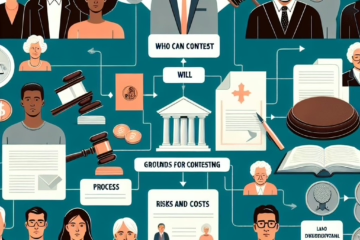A Will is a binding legal document but it can be contested in certain situations. Contesting a Will means challenging the validity of the Will or its terms, often resulting in a legal battle. In British Columbia, the Wills, Estates, and Succession Act (WESA) governs the process of contesting a Will.
When Can It Be Contested?
A Will can be contested when there are reasonable grounds to believe that the Will is invalid or that the distribution of assets under the Will is unfair. In this article, we shall refer to the contesting party as the “challenger”. The challenger must demonstrate to the court that there are valid reasons to set aside the Will or its provisions. Some common scenarios include:
Will Was Not Properly Executed
For a Will to be valid in BC, it must meet specific legal requirements under the WESA.1 These include:
- The Will must be in writing.
- The Will is signed by the the person making the Will in the presence of two witnesses.
- The witnesses must also sign the Will in the presence of the testator and of each other.
If these requirements are not met, a person may have grounds to challenge its validity on the basis that it was not properly executed.
The Testator Lacked Mental Capacity
A testator must have the mental capacity to understand the nature of their Will at the time they make it.2 This means the testator must be aware of:
- The nature of their assets and property.
- The individuals who may be expected to inherit those assets.
- The general effect of the distribution of their estate as set out in the Will.
If the challenger believes that the testator did not understand these aspects due to mental illness, cognitive decline, or a lack of mental clarity, they may contest the Will based on lack of testamentary capacity.
Will Was Made Under Undue Influence
Undue influence refers to situations where the testator is pressured or coerced by another person into making decisions that they would not have made under normal circumstances. This can involve emotional, psychological, or physical pressure.
If a Will was made under undue influence, it may be contested by the person who believes they were unfairly deprived of inheritance, or by anyone who suspects that the testator was manipulated. To succeed in this type of challenge, the challenger would need to provide evidence of coercion or manipulation.
There Was Fraud or Forgery
A Will can be contested if it is suspected that the Will was forged or fraudulently altered. This could involve altering a valid Will or creating a fake will that the testator never signed. If there is evidence of fraud, such as a forged signature or improper changes to the document, the Will may be invalidated.
The Testator Revoked the Will
A testator can revoke or alter their Will at any time during their life, as long as they are mentally capable. If a testator creates a new Will that revokes the old one, the old Will no longer has legal effect.
However, a person may contest a Will if they believe it was revoked by mistake. For instance, a person may find an older version of a Will that was not properly revoked or destroyed, or they may claim that the testator intended to revoke the Will but did not properly execute the revocation.
The Will Does Not Provide for Dependents
In British Columbia, certain dependents are entitled to make a claim for support from a deceased’s estate if the Will does not adequately provide for them. These include spouses, children, and other dependents who were financially reliant on the deceased. If a Will fails to provide adequate support for a dependent, they may challenge the Will under the WESA provisions governing dependents’ relief.3
Grounds for Contesting a Will in BC
To challenge a Will successfully, challengers need to present legal grounds for why the Will should be set aside. Some of the main grounds for contesting a Will in British Columbia are:
Lack of Testamentary Capacity
This occurs when the testator does not understand the consequences of their actions when making the will. As noted, the testator must have the mental ability to know what assets they are distributing, to whom they are giving them, and the legal consequences of their decisions.
Challenging a will on the basis of lack of mental capacity typically involves expert medical testimony, such as evidence from doctors or psychologists who can attest to the testator’s mental state at the time the will was signed.
Undue Influence
As mentioned earlier, undue influence involves coercion or manipulation that affects the free will of the testator. For instance, a caregiver or family member may pressure the testator into changing the Will to benefit themselves. In cases of undue influence, the challenger must provide evidence of improper influence and prove that the testator’s actions were not voluntary.
Fraud or Forgery
Fraudulent activity can include any act where the testator was deceived into signing the Will, or where someone forged the testator’s signature on a Will. Fraud challenges typically involve showing that the Will was not a true reflection of the testator’s intentions.
Dependents’ Claim for Support
If the deceased had dependents who were financially reliant on them, those dependents can make a claim against the estate for reasonable support. Even if the Will is valid, the court may determine that the dependents have a right to a share of the estate if the Will fails to provide adequate support.
Revocation
If the challenger believes that the testator had revoked or replaced the Will but the new Will was not properly executed, they can challenge the Will based on the testator’s intentions.
Steps to Contest a Will in BC
Contesting a will in BC requires following a formal legal process, typically through the courts. Here are the general steps involved in contesting a Will:
- File a Notice of Objection. You must first file a Notice of Objection with the British Columbia Supreme Court. It alerts the court and the executor of the estate that you are challenging the validity of the Will.
- Commence a Claim. This document outlines the reasons for contesting the will and the grounds upon which the challenger believes the will should be invalidated.
- Gather Evidence. The person contesting the Will will need to gather evidence to support their case. This could include medical records, witness testimony, expert reports, and any other documents that can help substantiate their claim.
- Mediation or Settlement Discussions. Before going to trial, the court may encourage the parties involved to attend mediation or settlement discussions. This is often an opportunity for the family or other parties to resolve the dispute without going through the lengthy and costly process of litigation.
- Court Hearing. If the case is not resolved through mediation, a trial will take place in the BC Supreme Court. Both sides will present their evidence, and the judge will make a ruling based on the law and the evidence presented.
- Appeal. If either party is dissatisfied with the decision, they may appeal the decision.
If you succeed in contesting the Will, depending on the facts of your case, the Court may:
- declare the Will or parts of the Will to be invalid
- impose an alternative distribution of the estate
- impose an alternative interpretation of the Will
If you don’t succeed in contesting the Will, the Will shall be given effect and the Estate must be distributed according to the provisions of the Will.
Conclusion
Contesting a Will is a serious legal action that can have lasting consequences for families and beneficiaries. The process can be complex and emotionally charged. Anyone considering contesting a Will should seek legal advice to understand their rights, the grounds for contesting, and the process involved. Legal counsel can guide the challenger through the process and help ensure that their claim is based on solid legal grounds, maximizing the chances of success in the litigation process.
Important: Please note that the information here is not meant to be legal advice. Do not solely rely on the information given here; it is important that you consult with a lawyer regarding any legal advice. Pax Law Corp. is not responsible for any reliance on the contents of this blog post. Any faces posted on this blog post is totally AI generated and they are not intended to represent any person in the real world. Any similarities are completely coincidental.



0 Comments